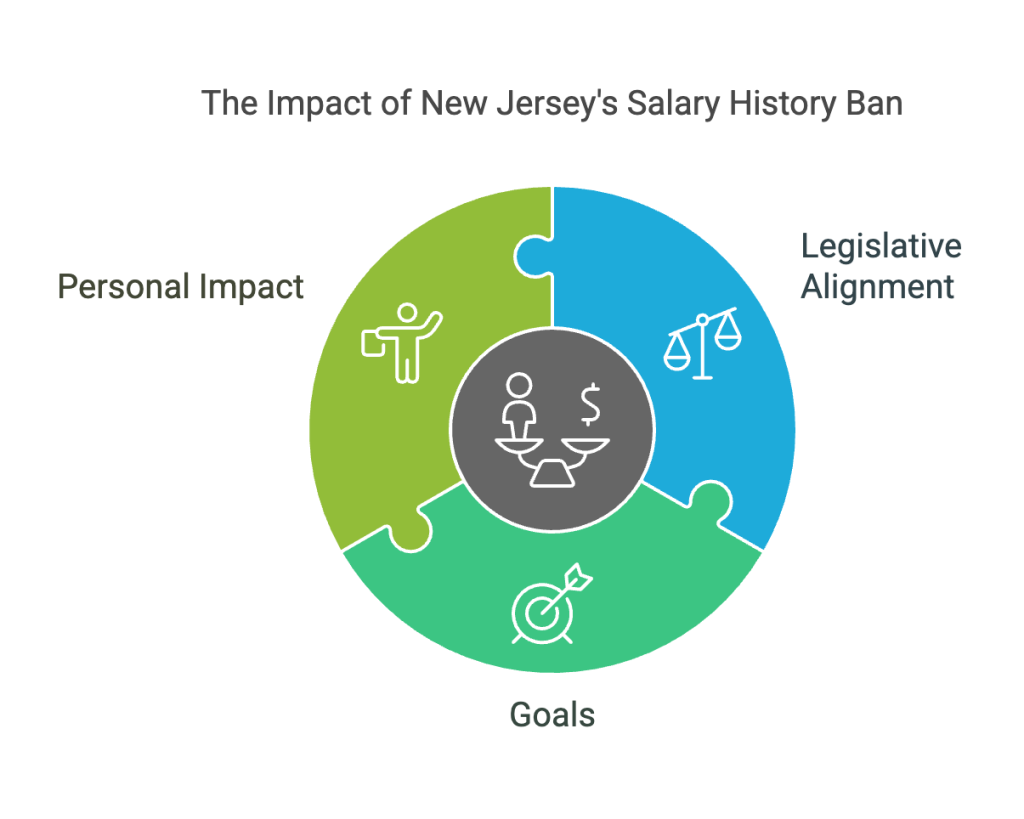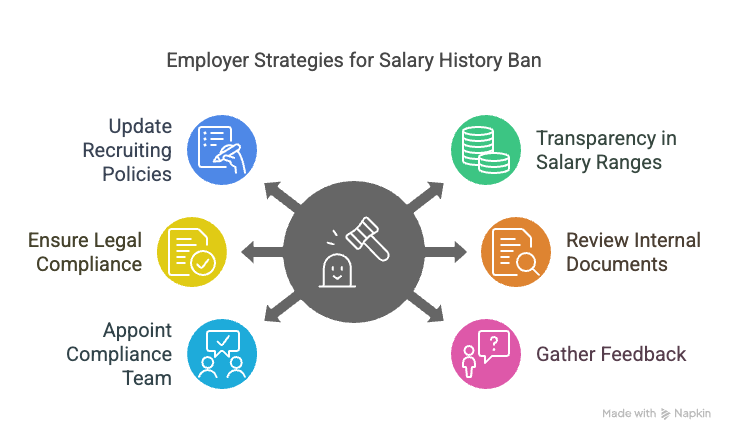In a move designed to promote workplace equity, New Jersey has implemented a salary history ban, reshaping how employers approach salary negotiations and employment verification. As part of the broader NJ wage equity laws, this legislation aims to address pay disparities that have long been a thorn in the side of employees and a challenge for employers striving for fairness and compliance.
This guide will delve into the nuances of the New Jersey salary history ban, exploring its implications for employment verification and wage equity within the state. Whether you're an HR professional, a business owner, or a job seeker navigating the job market in New Jersey, understanding this ban is crucial for legal compliance and fostering equitable workplace practices.
Key Takeaways
- The New Jersey salary history ban prohibits employers from inquiring about past salaries, aiming to eliminate wage discrimination and enhance pay equity.
- Employers must update their hiring practices to comply with the ban, focusing on skills and job requirements rather than previous earnings.
- The ban encourages transparency in salary offers and reinforces fair compensation based on the role instead of historical pay discrepancies.
- For job seekers, this legislation shifts salary negotiations toward current capabilities and potential, reducing biases tied to gender or race.
- Staying informed and compliant with wage equity laws positions your organization as a leader in ethical employment practices, promoting fairness and trust.
Introduction
Wage equity remains a significant focus in todayâs job market. New Jersey's salary history ban marks a firm step in tackling this issue, setting a standard for other states to follow. This legislation bans employers from asking about an applicant's past salaries. It forms part of a broader effort by New Jersey to ensure fair pay and to minimize historical pay discrimination based on gender and race.
You might wonder how this affects you or your business. Employers need to adapt their hiring processes, especially in employment verification and salary negotiations. Job seekers gain a fairer ground for negotiation, focusing on skills instead of past pay scale. This article explores these impacts, offering insights into the changes and challenges that lie ahead.
Understanding the New Jersey Salary History Ban
The New Jersey salary history ban is straightforward: employers cannot ask about or consider your past salaries during the hiring process. This law, effective since January 2020, intends to prevent salary discrimination based on past earnings. By omitting salary history questions, the aim is to create a fair wage determination process grounded in your skills and the role's requirements.
Legislatively, New Jersey's law aligns with a growing trend across the United States. This approach echoes similar laws in states like California and Massachusetts, forming part of a broader effort to achieve wage equity and eliminate pay disparities rooted in gender or race.

The primary goals of this law are ambitious yet crucial. First, it seeks to reduce gender and racial pay gaps by ensuring salaries are based on current market rates and individual merits, not previous undervaluations. Second, it fosters equal footing during salary negotiations, enabling discussions centered on rightful compensation for the job's responsibilities.
For you, understanding this ban means recognizing a shift towards a more equitable hiring environment. Reflect on how this affects your own approach to sharing salary expectations and negotiating pay based on job roles and responsibilities rather than past earnings. How might this impact your expectations and bargaining power?
NJ Wage Equity Laws: A Broader Context
New Jersey's wage equity laws go beyond the salary history ban. They are part of a comprehensive effort to ensure fair pay for everyone. These laws define wage discrimination clearly and set penalties for those who fail to comply. They also foster an environment where all employees are valued for their skills and roles rather than their gender or race.
The salary history ban is a key component of these laws. By prohibiting salary history inquiries, it seeks to eliminate pay disparities from the hiring process. Employers must now set salaries based on the role, not what someone previously earned. This approach challenges traditional practices, pushing employers toward more transparent salary bands.
When compared to other states, New Jersey stands out. Some states have similar bans, but not all with such scope. For example, Massachusetts also restricts salary history inquiries, but New Jersey's laws are part of a broader wage equity initiative. This interconnected approach aims to tackle the root of wage discrimination more effectively.
Consider how your company's policies align with these laws. Are your salary bands transparent? Do your hiring practices uphold these standards? Compliance isn't just about avoiding penalties; it's about building a culture of fairness where your employees feel respected and rewarded. How will your organization rise to this challenge?
Impact on Employment Verification in NJ
The New Jersey salary history ban has changed the game for employment verification. It forces employers to rethink what information they gather and how they use it. Employers can no longer ask job applicants for their past salaries. This shift encourages focus on qualifications and experience instead.
Background checks are still crucial. They verify employment history, criminal records, and credentials. But now they must steer clear of salary history questions. The Equal Employment Opportunity Commission offers guidance on these checks, ensuring no discrimination slips in.
Adapting to this new norm requires careful record-keeping. Employers should only store what's necessary. Forget collecting old salary info. Instead, keep clear records of job-related information. Check that your processes comply with the law.
Staying updated with any legal changes is key. This helps maintain compliance and ensure fair hiring practices. It's not just about avoiding penaltiesâit's about moving towards equitable hiring and a fairer workplace for all.
Strategies for Employers
Revise your hiring process to align with New Jersey's salary history ban. Begin with updating recruiting policies. Make sure they no longer include requests for an applicant's past salary. Train your team to focus on skills and experience instead of former paychecks. Employees involved in hiring should know what questions are off-limits.

Be transparent about salary ranges early in the hiring process. Sharing this information upfront helps attract the right candidates. It also fosters trust. Clear salary bands empower applicants to make informed decisions without guesswork.
Ensure your company's policies comply with NJ wage equity laws to reduce legal risks. Consider consulting with a legal expert if you are unsure about your policies. They can help confirm that your practices meet the state's requirements.
Review and update internal documents and communication materials. This helps maintain consistency in your approach. Regular audits can catch exceptions and correct them before they become problems.
Appoint a point person or team to oversee compliance. This group should prioritize ongoing education and updates. They should keep the company informed of any changes in legislation and best practices.
Finally, take the time to receive feedback from your recruiting team and new hires. Understand what works and what doesn't. This allows you to fine-tune your approach for future success.
Benefits for Job Seekers
When you're on the hunt for a new job, the New Jersey salary history ban can work in your favor. The ban ensures a fairer negotiating ground by removing past salary as a factor in your future pay. This means your wage expectations are based more on your skills and experience rather than what you earned before. This shift can lead to fairer compensation, especially if you have been underpaid in the past.
With salary history out of the equation, employers place more emphasis on your qualifications, achievements, and the value you can bring. This focus allows for a more accurate assessment of your abilities and potential contribution to the company. The conversation during hiring becomes about what you can do, not what you made before.
The ban also tackles another important issue: bias. When employers don't consider salary history, the risk of salary-based discrimination decreases. This includes biases tied to gender, race, or other factors. By focusing on current skills and experience, the hiring process becomes more about merit, reducing the chance of unfair pay practices.
Have you ever felt that your salary didn't reflect your capabilities? With laws like this, those feelings could become a thing of the past. You now have an opportunity to negotiate with a focus on your worth and potential. The playing field is more level, offering you a fair shot at compensation that truly matches your contributions.
Common Challenges and Solutions
Navigating the New Jersey salary history ban isn't without its challenges. One concern is wage inflation. Employers might overestimate a fair salary without historical data, leading to inflated salary offers. To counter this, companies can rely on market research. Using current salary benchmarks for specific roles within the industry can help establish competitive and fair compensation packages.
Educating stakeholders is also crucial. Hiring managers and recruiters must understand the legal and practical implications of the salary ban. Organize training sessions to keep everyone informed. This keeps your team aligned and reduces the risk of non-compliance. Share clear guidelines on what questions are permissible and how to evaluate candidates based on skills and experience rather than salary history.
When tackling these challenges, ask yourself: How can we enhance our interviewing process to focus on competencies rather than compensation history? By addressing these questions, you're better positioned to integrate the salary ban smoothly into your hiring practices.
Conclusion
Understanding the salary history ban in New Jersey is a step toward more equitable employment practices. The ban not only promotes fairness but also aligns hiring processes with modern expectations for workplace equality.
Employers should proactively update their hiring and verification methods. You need to adapt your practices to comply with the ban, ensuring that your hiring protocols respect candidatesâ privacy and focus on their skills. Integrate salary transparency into your recruitment strategies to foster trust and attract top-tier talent.
As workplace equity law continues to evolve, staying informed and compliant is crucial. Prepare for these changes and anticipate how future legislation may further impact employment norms. By embracing these adjustments now, you position your organization as a leader in ethical employment practices, setting a standard for others to follow.
Frequently Asked Questions (FAQs)
Can NJ employers ask about past salaries?
No, New Jersey law prohibits employers from asking job candidates about their salary history. The intention is to help close the wage gap.
How to verify employment without salary history?
You can verify employment through references or official employment records, like offer letters or termination papers, without discussing salary.
Are background check companies allowed to share salary data?
Background check companies cannot share your past salary information with potential employers in New Jersey.
What penalties apply for violating NJâs ban?
Employers violating the law may face fines and legal actions, potentially resulting in reputational or financial damage.
Do remote workers in NJ fall under this law?
Yes, the law covers remote workers if the position is based in New Jersey.
Can employers use public records to find past wages?
Employers cannot use public records to obtain past wage information to make hiring decisions in New Jersey.
Does the ban apply to internal promotions in NJ?
No, the ban does not apply to internal promotions or transfers within the same organization.
How to train HR teams on NJâs law?
Educate HR teams through workshops and updates on legal guidelines. Have role-plays and discussions on hypothetical scenarios.
Are bonuses considered salary history in NJ?
Yes, bonuses and other forms of compensation are considered part of salary history.
How to negotiate offers under NJâs ban?
Focus on expressing your salary expectations based on market data and your qualifications, not your past wages.
Can an employer retract an offer if they find out past salary information?
If an employer inadvertently learns your past salary through other means, they should not use that information to retract an offer. Retraction based on past salary violates the spirit of the law.
How can you demonstrate your worth without sharing past salary?
Highlight your skills, experiences, and achievements. Use market research to support your salary expectations.
Do all businesses have to comply with this law?
Yes, all employers in New Jersey, regardless of size, must comply with this law.
What should you do if an employer asks about your salary history?
Politely remind them of the law and steer the conversation towards your skills and the market rate for the position.

GCheck Editorial Team
Meet the GCheck Editorial Team, your trusted source for insightful and up-to-date information in the world of employment background checks. Committed to delivering the latest trends, best practices, and industry insights, our team is dedicated to keeping you informed.
With a passion for ensuring accuracy, compliance, and efficiency in background screening, we are your go-to experts in the field. Stay tuned for our comprehensive articles, guides, and analysis, designed to empower businesses and individuals with the knowledge they need to make informed decisions.
At GCheck, we're here to guide you through the complexities of background checks, every step of the way.






